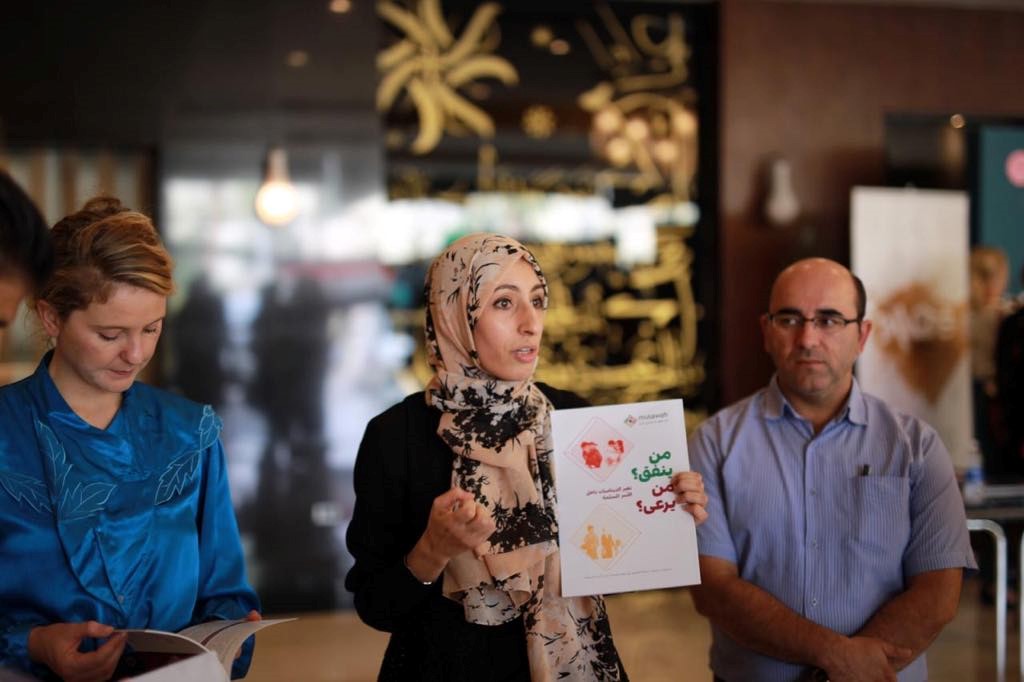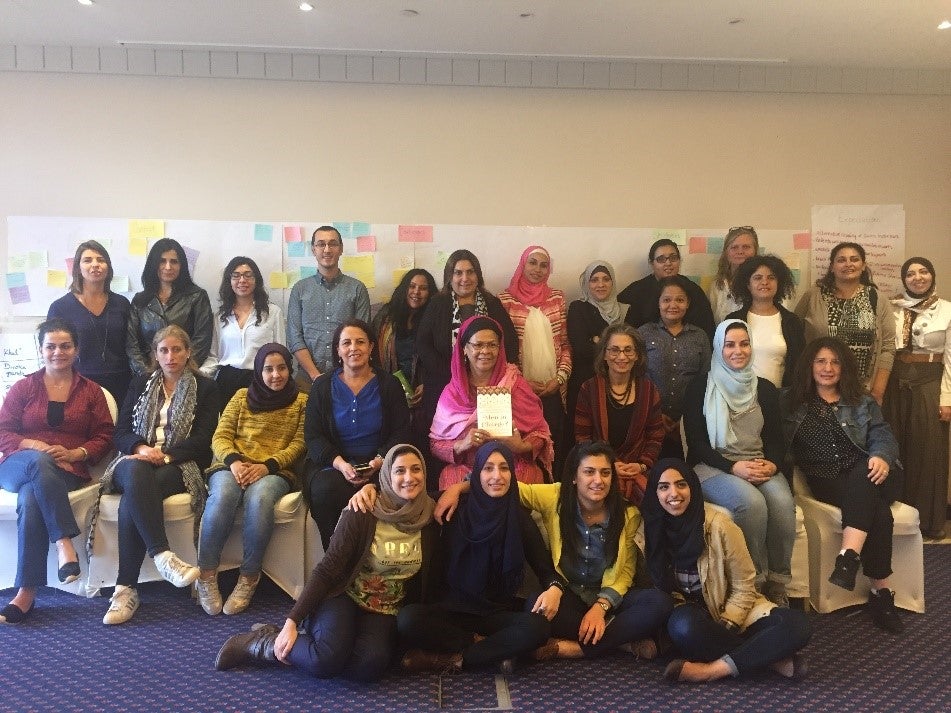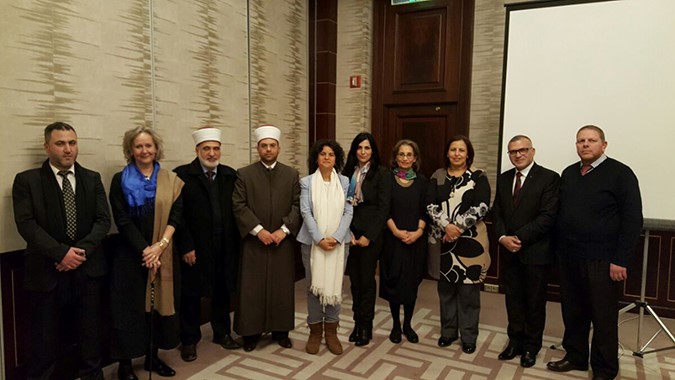Case study (number two) on the Regional Programme Men and Women for Gender Equality, implemented by UN Women Regional Office for Arab States, funded by Sida
Date:
There have been significant advances for gender equality in the Middle East and North Africa (MENA) region although much more remains to be achieved. Gender discriminatory laws and policies are still in place in many countries and men frequently control political and leadership spaces and to a large extent the daily lives of women and girls.
Religion provides many men and women in the MENA region with a moral and ethical framework, and rules on how to live a good live. However, gender discrimination is often legitimized based on patriarchal interpretations of religious texts.
It is against this background that UN Women’s Government of Sweden funded programme on Men and Women for Gender Equality (2015- 2019) sought to better understand the root causes of gender inequalities in the Arab States and to address them through an innovative bottom-up approach, including through the engagement of men and boys for gender equality. The programme has a specific focus on Egypt, Lebanon, Morocco and Palestine and will be extended to Jordan and Tunisia during phase II (2019-2021).
Research[1] findings on womens’ rights in Islam demonstrate how traditional attitudes around the concepts of qiwamah[2] and wilayah[3] are commonly used to legitimise men’s authority over women. Personal status laws and reservations to the Convention on the Elimination of all Forms of Discrimination Against Women (CEDAW), which many countries in MENA region hold, are often justified on the grounds that these provisions are against Shari’a law. There are no legal frameworks in the Arab region that fully ban gender discrimination.
Through the programme UN Women has supported Musawah ('equality' in Arabic) - a global movement for equality and justice in the Muslim family - to conduct research on women’s rights in Islam, including on Muslim legal tradition and family laws that influence gender roles in Muslim families. In 2018, the report, Who Provides? Who Cares? Changing Dynamics in Muslim Families was produced. The paper examines economic and parental rights and responsibilities in Muslim families[4] and argues that a transformation of family relationships is necessary and possible from within Muslim legal tradition, so that family relations are shifted from a relationship based on the understanding men’s authority over women to one based on equal partnerships between spouses with shared responsibilities and rights. This research compliments the International Men and Gender Equality Survey (IMAGES) MENA which also argues for equal sharing of care and household tasks.
Inspired by UN Women and Musawah, the Centre des Etudes et Recherches Féminines en Islam (CERFI) in Morocco,[5] under the supervision of Rabita Mohammadia des Oulémas, has undertaken a quantitative study to develop new knowledge and perspectives on the concept of qiwamah. This is the first time an official religious institution is tackling an issue related to gender equality by surveying public opinion in Morocco and analysing perceptions of qiwamah: the husband’s duty of providing financial support for his wife and children. The survey demonstrates that even though women contribute to the maintenance of their families and are the sole financial providers in many cases, society is reluctant to acknowledge rights corresponding to this role, or to reinterpret the concept of qiwamah. Finalized in 2018, the research will be used for dialogue with key stakeholders such as the Ministry of Religious Affairs as well as religious institutions, to promote alternative interpretations of Islamic texts.

Sarah Marsso, Knowledge Building Coordinator at Musawah presenting the report Who Provides? Who Cares? Changing Dynamics in Muslim Families. Photo: UN Women/Emad Karim
“We offer a new knowledge-based discourse and framework to advocate for equality and justice for women living in Muslim contexts. We fuse Islamic teachings with human rights principles, laws and constitutional guarantees of equality, and the lived realities of men and women,” Sarah Marsso
Based on the research a range of knowledge, capacity-building, and communications products with a specific focus on promoting gender equality in the Muslim family context have been developed.[6] These products have been widely disseminated on social media and used as tools for capacity building.
As part of this, UN Women supports Musawah’s Islam and Gender Equality and Justice (I-nGEJ) courses[7] that empower women’s rights activists to engage with Islam and challenge the way that religion can be used to justify gender discrimination. The research and knowledge products produced are used as course literature and participants are carefully selected to ensure they will use the knowledge they learn after the course. All developed concrete action plans, which are followed up by UN Women with guidance provided by. As a positive by-product, bringing together women activists from the MENA region for the I-nGEJ courses promotes cross-learning and collaboration among women’s rights organisations, while building individual capacity.

Islam & Gender Equality and Justice (InGEJ) Workshop, 21 – 27 November 2016, Jordan. Photo credits: UN Women ROAS
“My faith in Islam is really strong and this course has helped me realize that Islam is not as rigid as I thought. It also introduced me to tools that I can use to advocate for more equality from within Islam.”
- Female participant from the I-nGEJ course in April 2017
Many actions have been taken by the participants who attended these trainings based on the skills they acquired. The training provided by Musawah is also having an impact on a new generation of scholar-activists graduating from the Lebanese American University (LAU) in Beirut. For example, participants from the University of Cairo and from the Lebanese American University informed the curricula of i) the M.A. in Gender and Development Cairo University; and ii) the graduate course on Islamic and Arab Feminism of the Lebanese American University.
“When I took the course, it was at the time that we were launching a course for our master’s programme on Islamic Feminism. So, I gathered all the [Musawah] materials and gave them to the professor, who was going to teach the course. She used my readings and I introduced her to some of the books from the Musawah training. In the end, these are the material we used to create a master’s course for students who are doing interdisciplinary gender studies,” Myriam Sfeir, the Assistant Director of the Institute for Women’s Studies in the Arab World (IWSAW) at LAU. May Mansour, a student of the gender programme who travels each week from Jordan to take her classes at LAU, said “Reading about these interpretations made me realize that religion needs to be reinterpreted. Women need to take a stand and take part in the [religious] interpretation process. The Quran can be a tool of gender equality. I want to use its ayat (verses) to give a favorable interpretation to women.”
After completing the course, a participant from Egypt's Dar al-Ifta[8] prepared a long-term plan to develop Dar Al Ifta’s religious discourse and public resources that address gender issues in Islam. Her plan, part of which is already under implementation, includes revisiting the fatwas (official religious verdicts) and research relating to gender equality in Islam.
In Palestine, too, Musawah’s trainings are rippling through society. One of the participants of the training, also working with UN Women used her expanded knowledge to begin shifting one of Palestine’s most traditional institutions- the Sharia courts- to adopt more progressive stances for women. Religious courts in Palestine, whether Christian or Muslim, decide all family affairs, like marriage contracts, inheritance, custody, and divorce. Often, the courts are biased against women.

The topic of women rights and Islam, however, continues to be a sensitive area to tackle, given the entrenched social and cultural norms. The main approach has been to empower women’s organisations and give them tools and arguments to advocate on this area. Participants from the InGEJ course give excellent feedback, stating that they feel empowered in their personal and professional lives to use this new set of tools. However, many report that once they are back in their day to day reality, often in challenging environments, it is difficult for them to have discussions related to these issues, despite the resources on hand.
To address these concerns, and to seek to better connect and support people after the competition of the training, a regional strategy meeting was held in 2018 with a selected number of participants from the InGEJ courses to examine Musawah’s outreach approach and activities in the MENA region, and to recommend concrete ways to strengthen them and build a movement. A two-year action plan, which informs the next phase of the Men and Women for Gender Equality programme, was developed. Furthermore, a regional network of 15 MENA advocates promoting women’s rights[9] in the Muslim family was formed. They are supported through regular online sessions, building on the outcomes of the strategy meeting, in order to strengthen their capacity, and guide them on how to engage with advocacy from within Muslim legal traditions.
Building on this, UN Women facilitated a North Africa consultation in November 2018 on the role of religious leaders and institutes in ending child marriage and Female Genital Mutilation/ Cutting (FGM/C), where the research from Morocco on qiwamah was presented and discussed. The meeting discussed the gap between legal criminalization of these practices and the persistence of attitudes and practices at the community level. Participants emphasized the importance of using a community-based approach; and the need to raise awareness and engage men and women to prevent and eliminate child marriage and FGM/C, while advocating for governments to implement existing laws and provide services to survivors.
Moreover, after the meeting, a Researcher at Dar Al-Ifta Ms. Heba Salah wrote an article published in the Egyptian online magazine “Masrawy” about the negative consequences of child marriage and FGM/C on the Egyptian community, read more… .
Within this article she discussed the main issues raised during the North Africa consultation, and the recommendations that came out of it.
“Dar Al-Ifta criminalizes child marriage. Child marriage contradicts the rulings of Shari’ah according to Dr. Shawki Allam, the Grand Mufti of Egypt”, said Ms Salah, researcher at Dar Al-Ifta in Egypt.
Reverent Refaat Fikry echoed the words of Ms Salah; as FGM/C and child marriage are performed by Muslim and non-Muslim communities, he emphasised that “Christianity rejects FGM/C and child marriage. We need new and enlightened ways of thinking that respect human dignity”.
Religion is a crucial part of the social fabric across the world and in the region. Redefining traditional gender roles and expectations with faith leaders and communities is critical to transforming gender relations. Calling on interpretations of Islam and other religions that are in line with women’s rights, and preparing counter-arguments, is necessary to change power structures and encourage public debates on gender equality with communities, faith leaders, and governments. It is also central to efforts to advocate for the revision of personal status laws and the abolition of CEDAW reservations. Targeting religious leaders to build political will and finding common ground and shared ideals has proved to be successful and will be continued.
Through Faith Dialogue, Change Coming to Southern Egypt
Bringing religious leaders into discussions in Egypt helped UN Women’s partner organization CARE International to counter men’s resistance and fears to certain notions about gender equality. Mariam Ezzat Nathan, a senior field supervisor at CARE International in Egypt notes, “There’s […] this idea in Egypt that their religion gives men qiwamah (control) over women. They often quote their interpretations of hadith as a justification. To counter this, we worked with local religious leaders, who push back against these harmful interpretations, pointing our verses from the Quran and saying, ‘Our Prophet Muhammed treated his wife in an equal way.’ Most men agreed.” She continues, “Even if a few of the local men didn’t say they agreed with what the religious leaders said in the first session, they all continued to come back to our awareness-raising sessions time after time. They never broke off. This says that they’re convinced of our message.”
[1] Changing Roles, Changing Rights: Family Dynamics in Muslim Contexts, and the qiwamah research in Morocco, confirmed by IMAGES MENA
[2] Jurists developed the concept of qiwamah as a set of obligations and rights for men and women in marriage: husbands protect and provide; wives in turn obey. Source: Changing Roles, Changing Rights: Family Dynamics in Muslim Contexts, Musawah 2017
[3] Jurists understood wilayah to refer to the right and duty of fathers or male family members to exercise guardianship over their dependent wards (female or male). Source: Changing Roles, Changing Rights: Family Dynamics in Muslim Contexts, Musawah 2017
[4] Using Musawah’s approach which integrates Islamic teachings, international human rights principles, national guarantees for of equality and the realities of women and men’s lives.
[5] CERFI works under the supervision of La Rabita Mohammedia de Oulema an important religious institution in Morocco under the direct authority of the Royal institution. La Rabita Mohammedia de Oulema includes around 70 religious scientists, male and female, and undertakes awareness raising and academic research from several issues. It includes around 26 research centres in various areas including studies on women in Islam.
[6] Visit: http://arabstates.unwomen.org/en/what-we-do/ending-violence-against-women/men-and-women-for-gender-equality
[7] Visit: http://www.musawah.org/what-we-do/capacity-building
[8] Also known as “House of Issuing Religious Verdicts”.
[9]. Composed of participants from the Islam and Gender Equality and Justice courses facilitated by Musawah. The network was formed in 2018